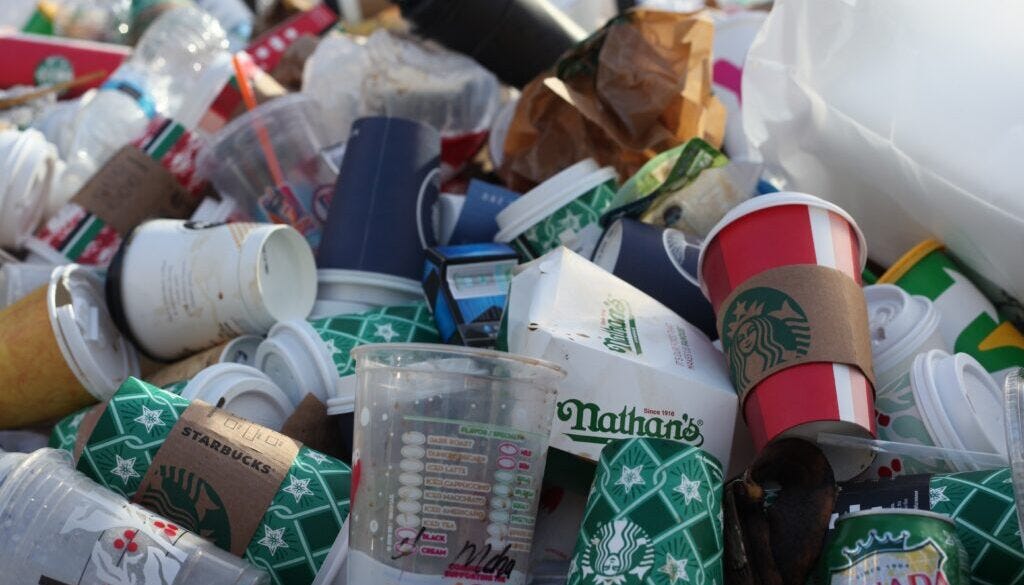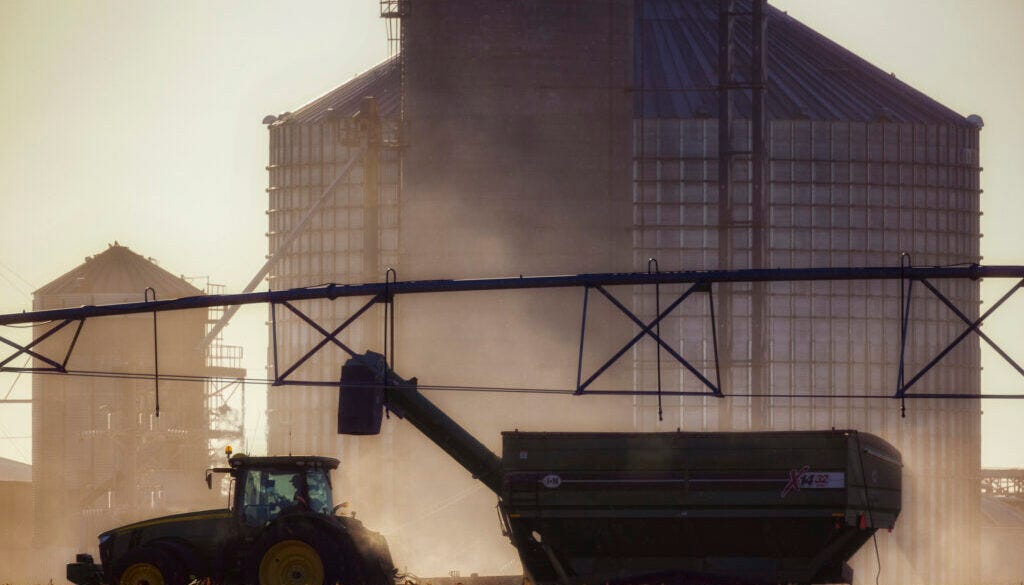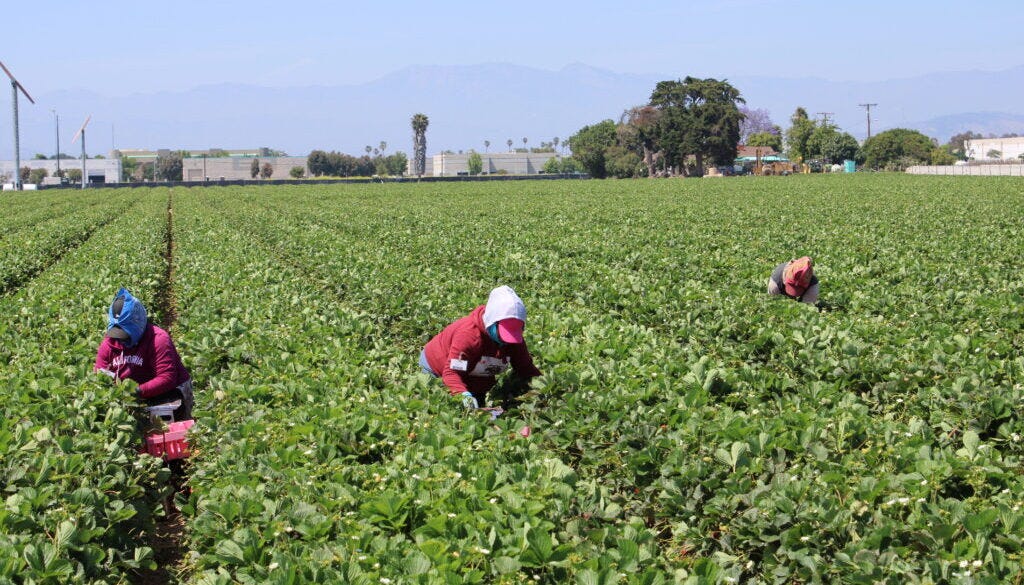Must-read recap: The New Lede's top stories
The hefty climate toll of single-use plastics, Biden misses the point on cancer fight, new US climate funding could worsen water pollution, and a bill to strengthen pesticide protections.
Single-use plastic waste is at record high levels, with hefty climate toll, report warns
From grocery store bags and soda bottles to take-out containers and food packaging, single-use, disposable plastic is a pervasive problem that presents not just waste management problems, but considerable harmful climate impacts as well, according to a new report.
Lifecycle greenhouse gas emissions associated with single-use plastic amounted to roughly 450 million metric tons of CO2 -equivalent in 2021, comparable to the total emissions of the United Kingdom, a new analysis has determined.
The Plastic Waste Makers Index released this week by the Australian-based Minderoo Foundation reports that there is more single-use plastic waste than ever – 139 million metric tons in 2021, an increase of 6 million metric tons from the 2019 amount – and that this fossil fuel-based plastic generated hundreds of millions of metric tons of climate pollution. Conventional recycling can help reduce these emissions, but recycling is not scaling fast enough and is expected to remain marginal, the report finds.
“This is a much needed, if devastating report. It demonstrates more clearly than ever how much single-use plastics blight our environment, and are themselves a key driver of climate change. And also that recycling is far, far behind where it needs to be,” Toby Gardner, senior research fellow at Stockholm Environment Institute and a contributor to the report, said in a statement.
The report updates a previous analysis of single-use plastic waste released by Minderoo Foundation in 2021, which identified for the first time the 20 largest petrochemical companies that are the sources for much of the world’s single-use plastic production. According to the new report, ExxonMobil leads the pack, followed by Chinese petrochemical giant Sinopec, and then Dow.
As the report explains, the majority of the emissions occur upstream during the production process, including fossil fuel extraction and refining of the petrochemical feedstocks that go into plastics.
Plastics are essentially fossil fuels in another form. According to the report, 98% of single-use plastics come from fossil fuel feedstocks. It is no coincidence that ExxonMobil, one of the biggest fossil fuel producers in the world, also ranks as the world’s top producer of single-use plastic. (Read the rest of the story.)
Opinion: Biden misses the point on cancer fight
In President Biden’s state of the union address Tuesday night, he pledged his devotion to a fierce “fight against cancer,” invoking a heart-tugging story of baby “Ava,” who began battling kidney cancer at the age of 1.
Biden spoke of a reignited “Cancer Moonshot” search for a cure for cancers that are impacting far too many lives, and of measures to cut healthcare costs to make treating cancer more affordable. He outlined an ambitious goal to cut cancer death rates by at least 50% in the next 25 years, and to “turn more cancers from death sentences to treatable diseases, provide more support for patients and their families.”
But nowhere in his lengthy prime-time address did Biden speak of working to rein in the vast, virtually unchecked, flood of environmental chemical contaminants that scientists say cause cancer.
A new book scheduled for release in May written by journalist Kristina Marusic lays out in stark terms how already-staggeringly highly rates of cancer are sure to continue to climb if we don’t slash our exposure to the chemicals known to cause cancer.
The harsh statistics are detailed by Phil Landrigan, director of the Program for Global Public Health and the Common Good at Boston College, in the introduction to Marusic’s A New War on Cancer: The Unlikely Heroes Revolutionizing Prevention.
Landrigan writes: “From 1975 to to 2019, the number of new cancer cases per 100,000 Americans—the incidence rate—increased for multiple cancers. Incidence of multiple myeloma rose by 46%, incidence of non-Hodgkin lymphoma by 76%, and incidence of testicular cancer by 70%. In the same years, incidence of childhood leukemia increased by 35% and incidence of childhood brain cancer by 33%. These increases are far too rapid to be of genetic origin. They cannot be explained by better diagnosis.” (Read the rest of the opinion piece.)
“A national sandal” — new US climate funding could make water pollution worse
The $369 billion Inflation Reduction Act was applauded by a chorus of US organizations and activists enthusiastic about the generous funding earmarked for projects designed to mitigate harmful climate change and improve environmental health.
But some researchers and activists are raising concerns that several provisions of the new law will actually worsen a growing environmental disaster in the nation’s heartland by increasing the tide of farm-related pollution washing into waterways and groundwater.
The sweeping new statute, which includes more than $140 billion in incentives designed to promote renewable fuels and cleaner electricity generation, aims to slash greenhouse gas emissions 40% below 2005 levels by the end of the decade. But in its efforts to promote climate-friendly agriculture, it also promotes corn-fed ethanol refineries and manure-based energy production that could unintentionally supercharge fertilizer and fecal contamination.
The Great Lakes and Midwest regions face nothing short of a water quality emergency, say those on the frontlines. Farming-related contaminants have already fouled thousands of drinking water wells from Minnesota to Missouri, and virtually every waterway in Iowa is degraded with little regulation to rein in the pollutants.
“It’s already a national emergency and a national scandal,” said Emma Schmit, senior organizer in the Midwest for Food and Water Watch, an environmental advocacy group. “When we test our waterways, the main pollutants are E.coli and nitrates and phosphorus from agriculture. These are pathogens and contaminants that can cause serious issues for people. We’re about to give large corporate farms carte blanche to make it worse.”
There are two particular farm-related provisions in the IRA that won’t put more food on the table but will impact water quality in the Midwest. One will incentivize producing more ethanol – a renewable fuel – from corn. Another will move to limit emissions of methane, a potent greenhouse gas, by processing manure generated by massive livestock and poultry farms. Though the investments are designed to reduce greenhouse gases and replace fossil fuels with cleaner options, the waste could end up polluting waterways.
The incentive for more corn production is particularly worrisome as farmers typically make heavy use of nitrogen fertilizers when growing corn, said Chris Jones, a research engineer and water quality specialist at the University of Iowa. (Read the rest of the story.)
Bill to strengthen pesticide protections offers farm bill “wish list”
Advocates are cheering a move by US Sen. Cory Booker to reintroduce a bill aimed at banning several pesticides linked to human and environmental health problems, but acknowledge the measure faces a long and steep uphill journey if it ever is to become law.
The “Protect America’s Children from Toxic Pesticides Act of 2023” (PACTPA) would outlaw several widely used chemicals popular with farmers to fight weeds and insects harmful to crops.
Supporters say PACTPA would help protect children, farmworkers, and residents of rural communities who suffer disproportionately from exposure to pesticides shown through scientific research to cause a range of health issues from cognitive problems to cancers.
But the agrochemical industry has dubbed prior similar efforts as threatening the “safety, productivity, and sustainability of our nation’s food supply.”
Among other provisions, the bill would help enable local communities to enact their own protective legislation and would put in place strict rules requiring employers of farmworkers to report pesticide-related injuries.
Booker initially introduced the bill in 2021 but it failed to gain traction amid strong resistance from powerful farm lobbying groups and the agrochemical industry, which reaps billions of dollars in annual revenues from pesticide sales. The new bill faces similar challenges, acknowledged by Booker and his staff.
Given Republican opposition control of the US House of Representatives there is “no realistic chance” for the pesticide bans called for in the bill to become law anytime soon, said Adam Zipkin, counsel to Booker. “It’s going to be such a heavy lift. Given the dynamics we now have in the House it just makes everything harder.”
Booker will keep advocating for this and other agriculture-related reforms but hopes in the near term to focus on getting some other elements of industry reform into the 2023 Farm Bill, according to Zipkin. The farm bill is a package of legislation that governs a wide range of food and farming programs and is typically renewed every five years. (Read the rest of the story.)




